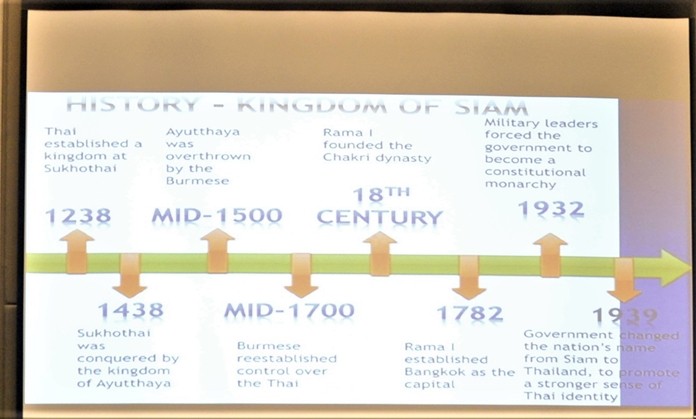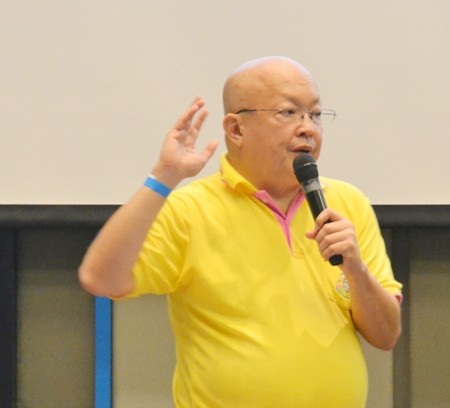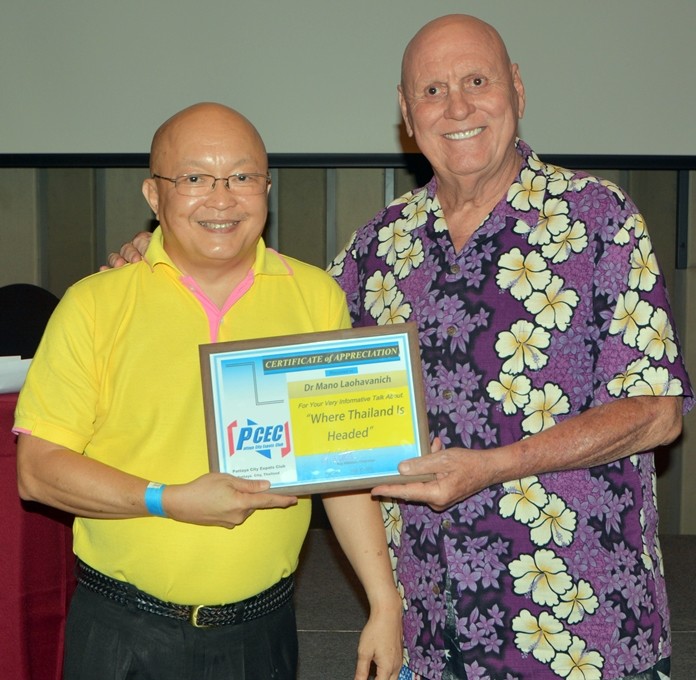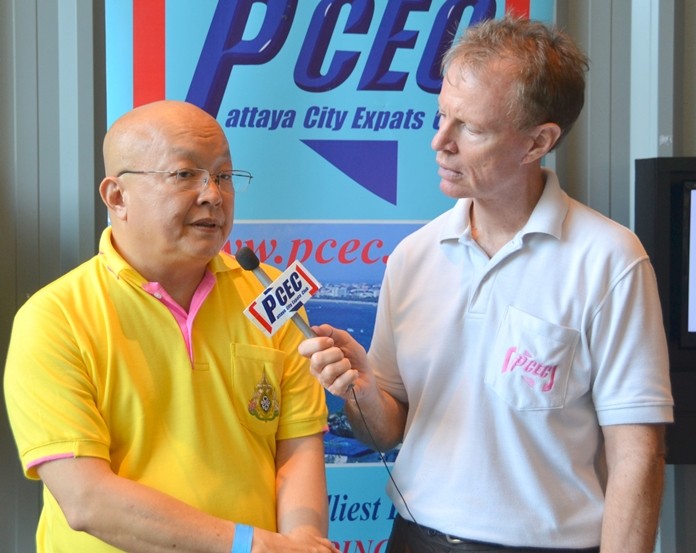
Mano Laohavanich, MD, PhD, presented a riveting talk to the Pattaya City Expats Club (PCEC) on the political history and future of Thailand, at their meeting on Sunday, May 5, 2019. Dr. Laohavanich’s talk contained a wealth of information on the political history of Thailand from 1238 A.D. to the current election process, as well as his insight into where Thailand is headed in the future; including how these political changes will affect Thai people, tourism and expat living here in the future. Additionally, he provided some views on the role of the monarchy as Thailand moves forward.
Dr. Laohavanich had the audience captivated with a timeline of Thailand’s political history, many details of which were not widely known to the audience. His talk covered details such as Thailand’s involvement with Japan during WWII, the frequency of the Thai government turnovers, many of which were government coups (13 successfully and 5 aborted), and the political players involved in these changes.

Included in the many topics regarding the future of Thailand, he mentioned international trade, foreign relation with other countries, currency exchanges rate expectations in the future, the structure of the new Thai democratic system to be implemented, timeline for future events in Thai politics, global warming – its impact and Thailand’s strategies for mitigation of its effects, and future Thai government relationship with expats.
Many of these comments were in response to questions from his audience, giving his views on what will happen. One dealt with the government’s addressing corruption, to which he responded, corruptions is expected to be reduced in the future under the new government. In addition, social media, such as a Facebook, Line, and Instagram which broadcast news of any wrong doing has helped reduce corruption.
Another dealt with expectations for currency exchange involving the Thai baht. He responded that he thinks the Thai currency is too strong because of the stock market and the trades related to other countries. He believes the Thai baht value should be lower, maybe 33 baht to one U.S. dollar would be appropriate. The current exchange rate is not good for tourism and import trade, although it is good for exports.
Regarding climate change, he explained that there is a plan being developed to reduce the use of fossil fuels. Thailand plans to help the environment by using alternative energy sources, such as solar and wind power, but he doesn’t think this will happen soon. In addition, Thailand is developing a national disaster plan to address the impact of global warming.
Dr. Laohavanich in responding to a question about the future relationship of Thai government and expat retirees, said he does not think it will be a difficult time for the retirement process and other paths that benefit foreigners who settle in Thailand. He thinks that Thailand is now well aware that it has to promote tourism and long stay of people.
In responding to questions, he said that he believes that Thailand faces some challenges in the world regarding international relations, for example, the United States and China; Thailand has to balance its relationships, but one thing is for sure, the relation with China and Russia is going to improve.

On the political scene and its impact on the economy of Thailand, he said he thinks the Thai economy is no longer based on agriculture; Thailand produces cars and lots of car exports for China from Japan, Japan builds many manufacturing plants here for car manufacturing, also Thailand has a lot of investment coming from EU and United States. Further, Thailand is now somewhat of an industrialized country and he thinks the economy is going to grow, not very fast this year, only about 4%. He noted that the Thai agricultural industry will suffer due to a drought, so farming will not be as good as last year. However, he believes this will be compensated with tourism.
Additionally, Dr. Laohavanich graciously provided a free mediation session to all member attendees after his presentation which was well received by all who attended.
Dr. Laohavanich’s background is quite impressive. Having graduated from the Faculty of Medicine, Chulalongkorn University in 1981, became a monk known as Mettanando Bhikkhu. Finishing all the three grades of Buddhist monastic education, he furthered his study at Oxford University, UK, majoring Sanskrit with Pali and Buddhist literature. Further, he continued his study at Harvard Divinity School, Massachusetts, USA and was award Master of Theology in Buddhist Medical Ethics, focusing of HIV/AIDS epidemics in Thailand. Later, he continued his Doctorate degree at Hamburg University, Germany on “Healing Meditation”.

He disrobed in 2007, after publishing a book, “After Buddha,” wherein he used Buddhist principles of investigation and science in the investigation of the Death of the Buddha and its consequences which stunts the Buddhist World. He was named “Galileo of Theravada Buddhism” by Arthit Magazine in Thailand. He wrote numerous articles on Buddhism, cultures and speakers in many forums worldwide, and served as the Advisor to the Secretary General of WCRP (Religions for Peace), the world largest ecumenical organization working for peace for 20 years.
Also, he has been active in reforming Buddhist monastic communities in Thailand. He served at Chivasom in Hua Hin, Thailand as the Spiritual Advisor. He supervised the first hospice of Thailand at Mahavajiralongkorn Hospital, and serves as the President of Palliative Care Thailand Foundation. Currently, he is the Director of Gandhi Institute and Vice Dean for International Affairs, College of Social Innovation, Rangsit University. Politically, he is the Secretary-General of the People Reform Party of Thailand.
The meeting ended with the usual announcement of upcoming events and the Open Forum, where questions are asked and answered about expat living in Thailand. For more information about the Pattaya City Expats Club, visit their website at www.pcec.club.
 |
 |





